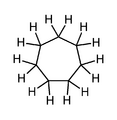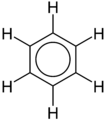Cyclic compound facts for kids
A cyclic compound is a special type of molecule where some of its atoms are linked together to form a loop or a ring. Think of it like a tiny chemical chain that connects back to itself to make a circle!
Most of the time, these ring-shaped molecules are part of organic chemistry, which is the study of molecules that contain carbon. But there are also many examples of inorganic molecules that form rings, meaning they don't always have carbon as their main building block.
Some cyclic compounds are called aromatic. These molecules are usually very flat. A good example is Benzene, which is a simple aromatic cyclic compound. If a cyclic compound is not aromatic, its rings usually aren't flat. This helps the atoms avoid bumping into each other too much, which chemists call "steric effects."
-
Benzene, a flat, aromatic ring-shaped molecule.
Contents
Why Are Cyclic Compounds Important?
Cyclic compounds are super important in many areas of science and our daily lives. Many drugs, like aspirin, are built around these ring structures.
Chemists can also do many reactions to either create new cyclic compounds or break them apart. These reactions are key to making new medicines, plastics, and other useful materials.
Types of Cyclic Compounds
Cyclic compounds can be grouped in different ways, depending on what atoms make up their ring and how they are arranged.
Organic Rings
When the ring is mostly made of carbon atoms, it's called an organic ring. These are very common in nature and in things we use every day.
Inorganic Rings
Sometimes, rings can be made of atoms other than carbon, like nitrogen, sulfur, or phosphorus. These are called inorganic rings. They are also very interesting to scientists.
Images for kids
-
Benzene, a 6-carbon ring that is aromatic, meaning its electrons are shared all around the ring.
See also
 In Spanish: Compuesto cíclico para niños
In Spanish: Compuesto cíclico para niños
 | James Van Der Zee |
 | Alma Thomas |
 | Ellis Wilson |
 | Margaret Taylor-Burroughs |







